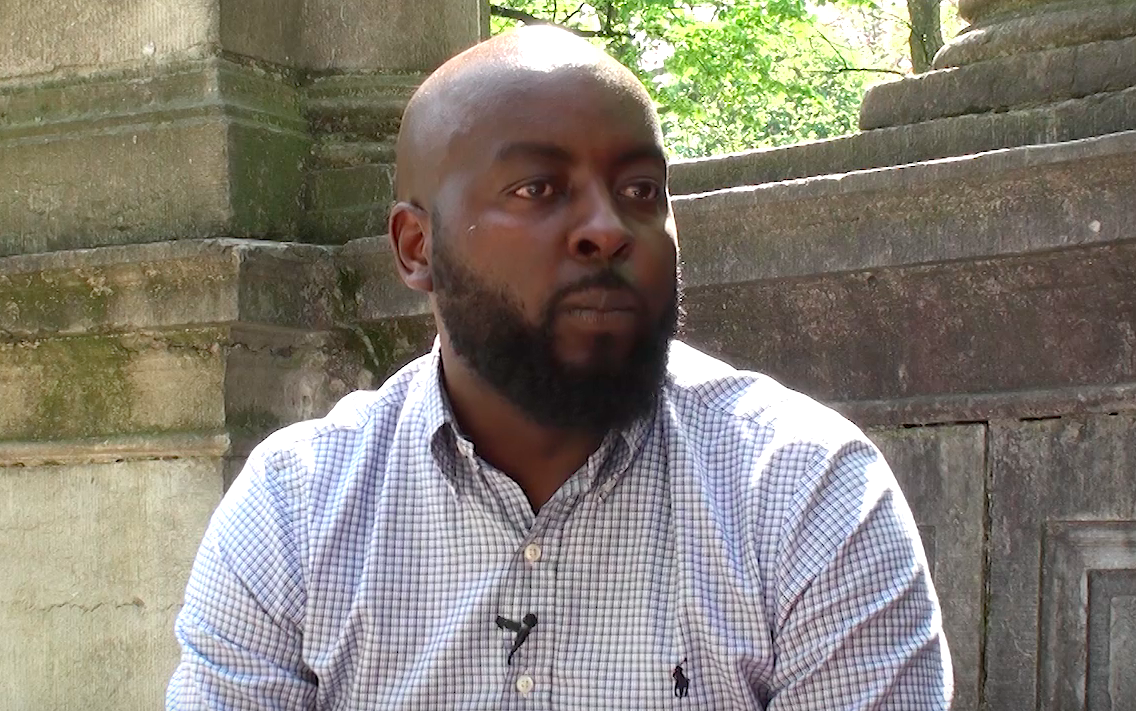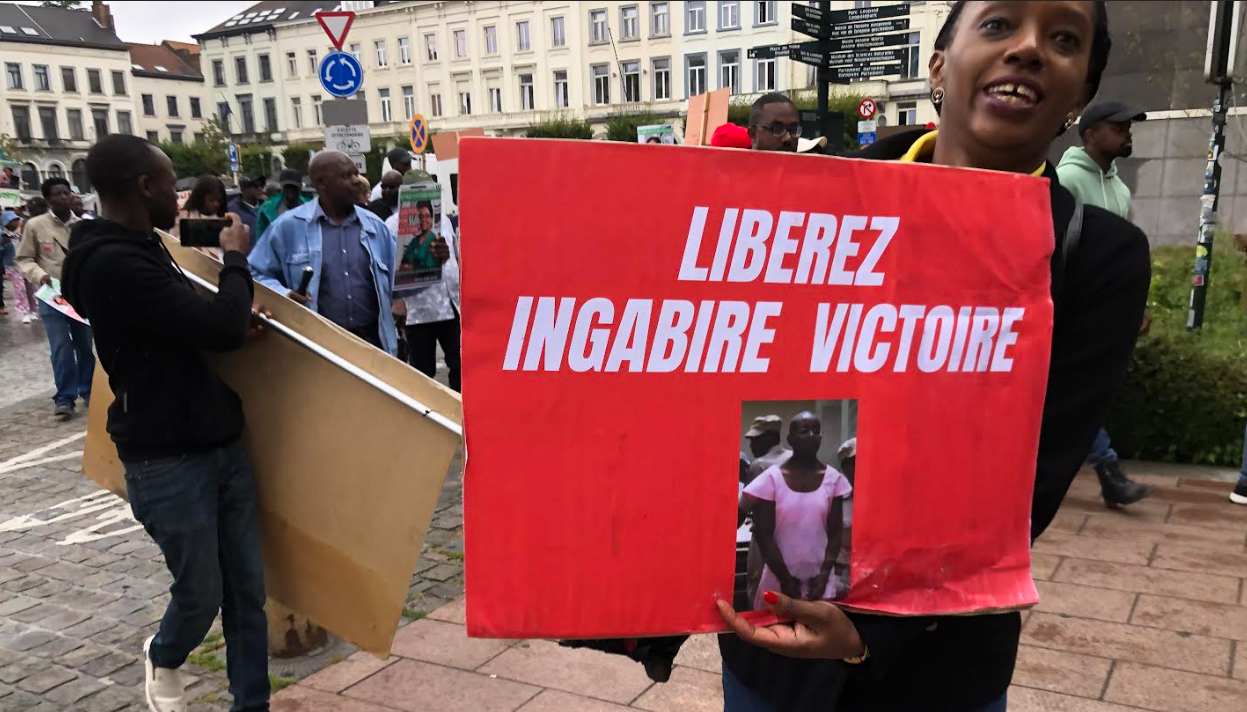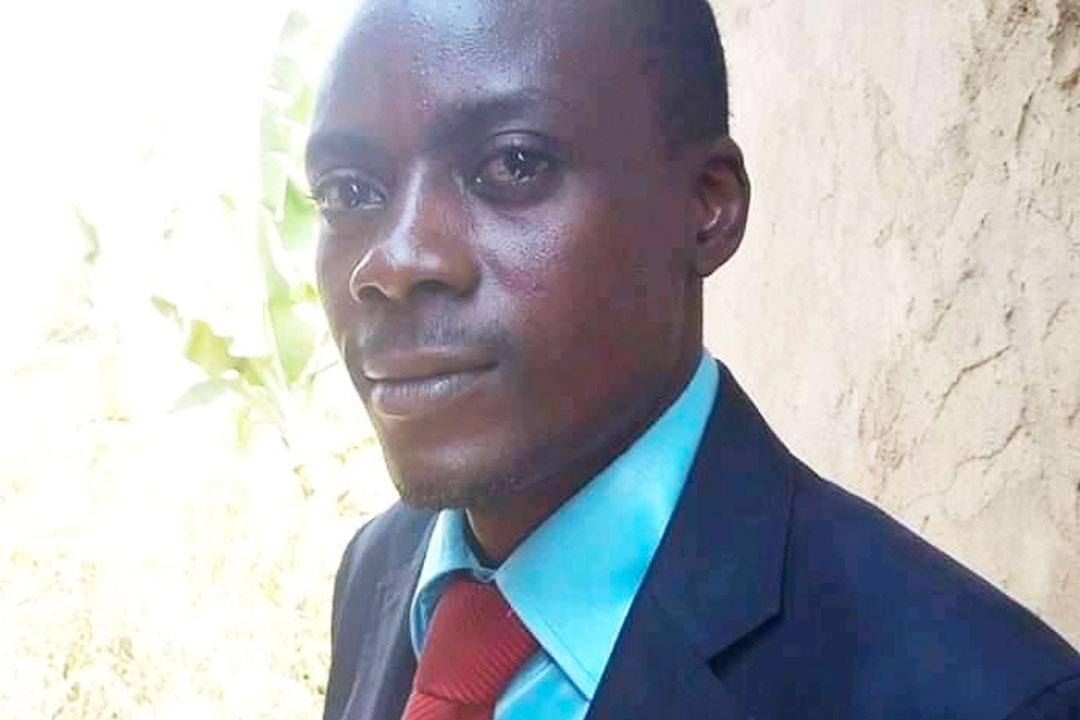On this Saturday the 21st of April 2018, Jambonews met with Didier Niyibizi, 36, survivor of the atrocities committed against the Hutu in April 1994 by the Rwandan Patriotic Front (RPF). Didier is the oldest of a family of 5 children. Currently he lives with his wife and three children in Brussels.
Didier recalls his childhood in the prefecture of Gikongoro in Nshili region, where he spent most of his younger years. When responding to the first question concerning the relations between the different ethnic groups at that time, Didier tells us that he never heard people talk about ethnicities then ‘’I do not remember hearing anything about this question during my childhood’’, he says.
The first time he heard about ethnic groups, he explains, was in 1990, after the RPF-Inkotanyi attacked Rwanda. “Around me, at my school, teachers or passers by would say, ‘They have attacked again’”, referring to the past attacks that took place in the Nshili region of “former Tutsi refugees who fled Rwanda and passed through Nshili to attack Rwanda“. However, Didier assures us that this attack of October 1, 1990, did not have any influence on the daily life of the population, “I did not notice any particular changes in the relations between the ethnic groups as a result of this attack.”
Didier’s father is from the municipality of Cyeru in the Ruhengeri region of northern Rwanda, where war and atrocities against the population had begun in 1992.
During their childhood, Didier remembers, “we went twice a year to our grandfather, but starting from 1990, we would see many soldiers, many road blocks, which implied that there were serious security problems, and from 1992, we did not return [to Cyeru] because the RPF had taken over the area. As far as he can remember, 1992 was the first year that Didier was “directly and personally impacted by the war.”
“ several elected officials and their supporters who remained at Cyeru had been killed by the RPF”
Didier recalls what his father told them about the events that took place in the municipality of Cyeru before 1994. In 1993, according to Didier, “there have been free elections in the ‘demilitarized’ zone, also known as the “zone tampon’’, which was created after the RPF and the Rwandan government had signed [peace] agreements. Cyeru was part of this so-called zone tampon. Those elections included all political parties of that time, including the RPF. During the votes, their father, Stanislas, supported Alphonse, a family friend who originated from the same hill. The latter was elected Mayor of the municipality of Cyeru, after largely winning against other candidates including the RPF’s. The RPF in return was not pleased as it barely won any of the seats in the competition. The post-election atmosphere was so atrocious that their father and Alphonse preferred to move to Ruhengeri, where Alphonse taught English.
A few days later, their father returned to the family home in Kigali, “he told us that during the days following the elections, several elected officials and their supporters who remained at Cyeru had been killed by the RPF, some my dad knew them personally “, says Didier.
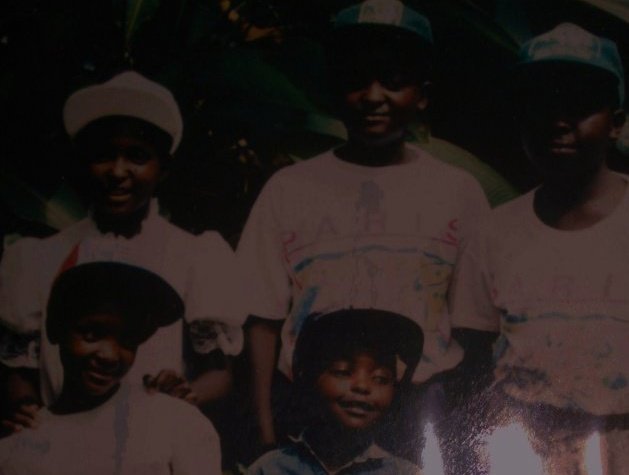
In March 1994, all students of the Marie-Merci School Group in Kibeho where Didier was attending secondary school, were sent home following riots. At the beginning of April, the school requested the pupils to return and Didier’s father was supposed to drive him back to school. “My little brother Olivier begged my father to come with us. Initially my mother was reluctant, but in the face of Olivier’s persistence she finally gave in’’. This is how Didier, his father and Olivier left Kigali for Kibeho. His mother, his two younger sisters and the youngest of the family, aged 9, 7 and 4 years, respectively, remained in Kigali in the family home.
On April 6, 1994, his father was still in Gikongoro. He was supposed to return to Kigali the same day, but after some delay he planned to spend the night in Gikongoro and return to Kigali the next day instead. It was during this evening that the attack against the presidential plane took place. “My father found himself stuck because from April 7, everyone was instructed to stay at home, we could not move freely. ”
“Any Rwandan would not forget this date because for me it marks the date on which darkness descended on our country.”
Didier was still at the boarding school in Kibeho, and it was during the night around 10-11pm that he heard the news [of the shooting down of the presidential plane]: “I remember that evening clearly. I think that any Rwandan would not forget this date because for me it marks the date on which darkness descended on our country.’’ At first Didier thought the news might be rumours, but in any case, he did not think it would have such a big impact on the country.
In the days that followed, when Didier and his comrades would walk across the approximately 1 kilometre long road separating their dormitories from the refectory, they observed more and more people who were flocking to their school and piling up on the side of the Kibeho Church. The elders explained to Didier who these people were. “They are Tutsi refugees who are fleeing from people who want to kill them’’. The refugees were surrounded by “police forces who had come to protect them from the threat of the Interahamwe who were around. ”
Didier lived under these conditions of “bad atmosphere and extreme tension” until around April 9 when his father asked policemen to pick him up. “Thanks to the fact that Nshili, where my father was, had long been considered as a risk zone and for that reason the security had been reinforced. There was a camp of police forces that protected the area since the first attacks by the RPF. My father took advantage of the fact that these police had to shift and joined the police forces who were leaving to go and pick me up.
It is in this climate of tension that Didier left Kibeho. He tells us that he later learned that many people had been killed in Kibeho, and only a few had survived. “It’s something that affects me, especially when I think of all those students who were in school and who were slaughtered there. ”
From the moment Didier joined his father and his brother, the three of them only had one wish: to return to Kigali to find their mother and their siblings. It is for this purpose that they took the road to Kigali before being stopped in Gitarama. “We were told that no one was allowed to pass for security reasons. ”
They then decided to stay nearby in the Catholic mission of Kabgayi, with friends of his father who were priests. Every morning, Didier, his father and his brother, observed the same ritual as they saw columns of refugees who came from Kigali fleeing the RPF. The refugees were in search of their family: “There were many, many refugees. Some were in cars, but the majority were on foot, some had just small bags and were tired, we could see that they were people who had left their home suddenly […] Most of those fleeing to Gitarama were fleeing the RPF. ”
‘’We thought maybe someone had hidden them, that even if they had been killed, one of them could have survived.”
During those days, Didier and his family started receiving disturbing news about Kigali from the refugees. The refugees told them that there was little chance that people from their neighbourhood would survive. “We lived near the national parliament building (CND), in Remera, as soon as the plane was shot down, RPF soldiers went to our neighbourhood and exterminated our neighbours. Only few people survived’, Didier explains. But despite the discouraging news, Didier and his family kept hope. “We thought maybe someone had hidden them, that even if they had been killed, one of them would have survived’’.
The ritual of spending their days watching the parade of refugees continued for a few more days, until around mid-April when Olivier, his little brother, came running to Didier and his father “He was excited, happy, and he shouted, “Daddy, daddy, mom and the others are coming!” We were happy and we all ran towards him [Olivier], “. His little brother had seen their domestic worker. When he reached Didier and his family, he told them the devastating news regarding their family. “They were all shot in our family home, none survived. ”
Didier speaks with grief: “We cannot say that there was war in our neighbourhood because from April 7, it was an area entirely controlled by the RPF.” He then continues to tell the details of that fateful day as they were told by their former servant: “Most of the houses in our neighbourhood had water tanks outside, people would wait until the gunfire ceased to go and fetch water. Our domestic worker was considered the man of the house at that time, because he remained alone at the house with my mother, my two little sisters, and my little brother. When he arrived at the tank, he saw soldiers climbing up the fence of the house and hid behind the tank. He heard the soldiers asking each other “did you check whether the Niyibizi were gone?” “. Didier points out that he does not know how the soldiers got the information, but says ‘’they had lists, they knew who owned the houses and asked if people were there. ”
‘’No one was spared’’
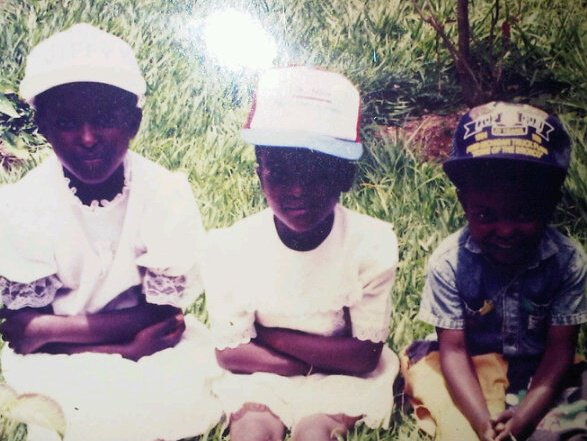
Once inside the house, the soldiers found the mother, the little sisters and the little brother of Didier. “They were children and a woman, the soldiers did not ask for anything, they had no mercy on anyone, they did not even ask for identity cards. They shot everyone, our servant was scared waiting outside. Shortly after the soldiers left, he went back to the house thinking that, maybe since there were children, maybe the youngest could have been spared. But inside the house, he was met with horror; the whole family had been killed. ”
Didier reiterates: “In this area there was no FAR [Rwandan Army Forces], and the Interahamwe never settled there because RPF soldiers occupied the neighbourhood from the early hours of April 7. They [RPF] killed a lot of people.’’ Later, as he fled Rwanda and went into exile, Didier met with former neighbours who all had similar stories. “It was as if everybody lived in the same house, the stories and methods used were the same. They [RPF soldiers] came in with lists, they came in shooting at anything that moved, they spared nobody, they made no distinction between the occupants of the houses. ”
After finding refuge in exile, his late father dedicated his life to getting justice for his family. “When a person kills your wife and three of your children, you do not sleep anymore, you dedicate your life to attaining justice for the crimes committed, especially since many more people were also concerned. ” Didier’s father passed away later due to illness.
Determined to seek for justice, his father had gathered testimonies from survivors and other families who were concerned with these massacres, intending to bring the case before a court of law. He communicated all the details to Carla Del Ponte who was then a prosecutor at the International Criminal Tribunal for Rwanda. Although many of the victims and perpetrators of these massacres were identified by name, the ICTR never prosecuted those crimes, while they were within its jurisdiction.
‘’The perpetrators of these crimes are now important people in the Rwandan regime“
Didier tells us about the perpetrators behind these atrocities: “The perpetrators are known, those who led the attacks, they are now important people in the Rwandan regime. Being an important figure in a government while you killed innocent people does not wash off your crimes. If at least they [RPF] recognized that many people had been killed by the RPF for what they were. The Interahamwe killed many people for no other reason than simply being Tutsis, and the RPF soldiers also killed many people, women and children who were innocent and who were not into politics. It is an injustice with which we live. It is sad to see that these victims are not even officially recognized, that one does not even have the right to commemorate them.’’
When asked if he had the opportunity to bury his loved ones, Didier explains: “It is an additional pain with which we live. They were killed in our family home, and after 1994 we learned that our house was inhabited by an RPF officer who was among those who led the military operations that took place in our neighbourhood. It hurts even more to know that the person who knows what happened to our families’ bodies, is the one who is now living in our home. You live with this sadness. In addition, it is made worse by the injustice [of the RPF] of telling you that those you have lost have no value, that you have nowhere to commemorate them. ”
Didier never returned to Rwanda. “Maybe the day will come but for now, I have no desire. If I went, the first thing would be to go to my house where my family was murdered. Even if nobody knows where their bodies rest. But until now, I have never felt comfortable to take that step. He adds: “My children go there but I never felt the desire to go back. This month of April 1994, it’s as if my life had been paused and the play button had never been re-started since. ”
“I accepted it, these are wounds I live with”
“When you are a victim of such an injustice that is caused by a person more powerful than you, and you are helpless in the face of injustice, the best is to accept it and live with that pain. “Despite this pain’’, says Didier,” I have no hatred towards anyone. Our loved ones are gone, I accepted that, even though I live with these wounds. I do not hate, because for me it’s hate that caused all of that. It is the injustice of some that has pushed others to take up arms, but war never leads to anything positive. Yet, many wars begin with someone who considers himself the victim of an injustice.”
Today, 24 years later, what saddens Didier the most is that Rwandans do not seem to have learned anything from this painful past. “My family passed away like many others, many innocent people also died during the genocide against Tutsis. The question I ask myself is, although they left, what lesson did we learn from it? It’s been 24 years since we organise commemorations, but instead of holding speeches of love, forgiveness and appeasement, we spread messages of guilt and division every year. ”
The question should not be who to blame, but rather, “How can we live together, how can my child live with the child of a Tutsi survivor who lives in Kigali? And what saddens me most of all is that the people who are in power, those who have the ability to appease hearts, do not put any effort in that direction. They do not stimulate people to find soothing. ”
According to Didier, the current issue is ‘’the institutionalism of the problems, these divisions that are instrumentalized. Because, whether we like it or not, we have the same house where we all have to live together and that place is Rwanda.” It does not make sense, he adds, “that someone is trying to burn the house down while another is locking himself inside so that those on the outside cannot get in. The ones on the outside have nowhere else to go. ”
For him, the solution to the division that torments Rwanda, is found in compassion. “We must have compassion and understand that the pain of the other is also a pain. Whether you are Chinese, Indian, Hutu or Tutsi, your mother is unique, no one can replace her, you must understand that the pain of the other is also a pain, no one should think that his pain is above that of the other, we are all the same and we should consider another person’s pain like it is ours. ”

“We behave as if history has not taught us anything”
Didier continues by sending a message to the youth: “I sometimes see banners with the slogan ‘Never again’, but for this slogan to take root, it must begin with compassion. If we consider some to always be perpetrators by nature while others are always victims, how can we claim to build a ‘never again’ with such a message? The ‘never again’ is built through compassion, empathy and awareness that the pain of the other is mine. It is built by understanding that all those who were involved in these crimes, whether dead, in prison or currently in power, all have equal responsibility for these atrocities.”
He continues with a specific message to the survivors: “The survivors of these crimes should rebuild themselves rather than oppose each other. How can two people both lose their loved ones and then oppose each other when it’s time to remember the late? For Didier, this opposition, this cleavage during a time of mourning is what saddens him in the first place. “It’s as if history has not taught us anything“.
And in a solemn tone, Didier concludes by addressing himself to all the survivors; the victims of the genocide against the Tutsi, all the victims killed by the interahamwe and the victims of the RPF: “Let’s be strong, let’s support each other, there is not a one Rwandan who has not lost someone. If you know someone around you who has lost someone, go to him, support him in his pain, give him courage”. He shows sympathy to all victims and say: ‘’The most important thing today is to look forward, what are we going to teach our children? Those hatreds that have led us so far or the love and compassion that will allow us to get out of it? ”

